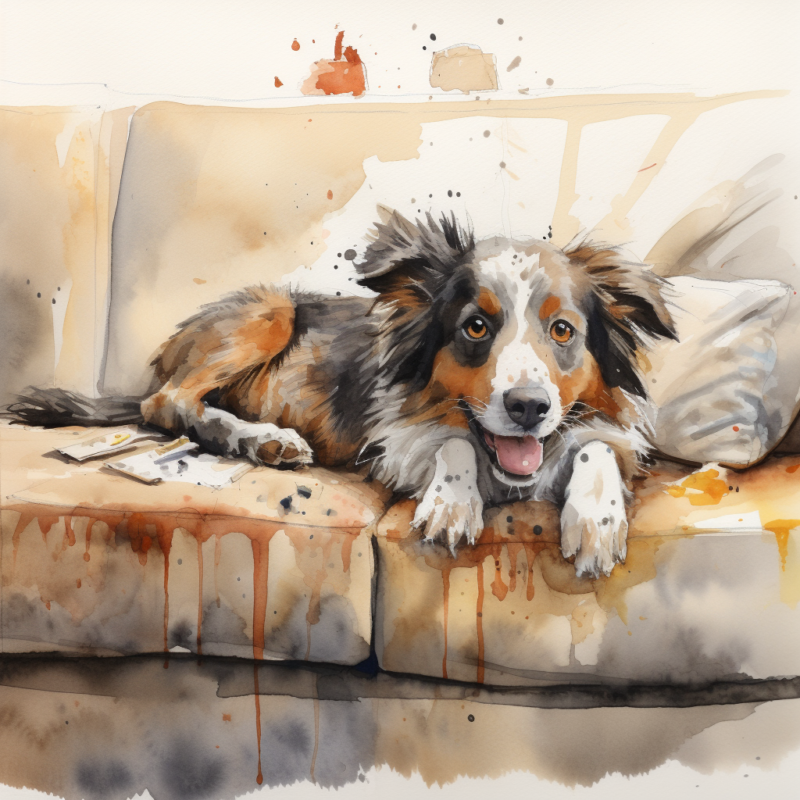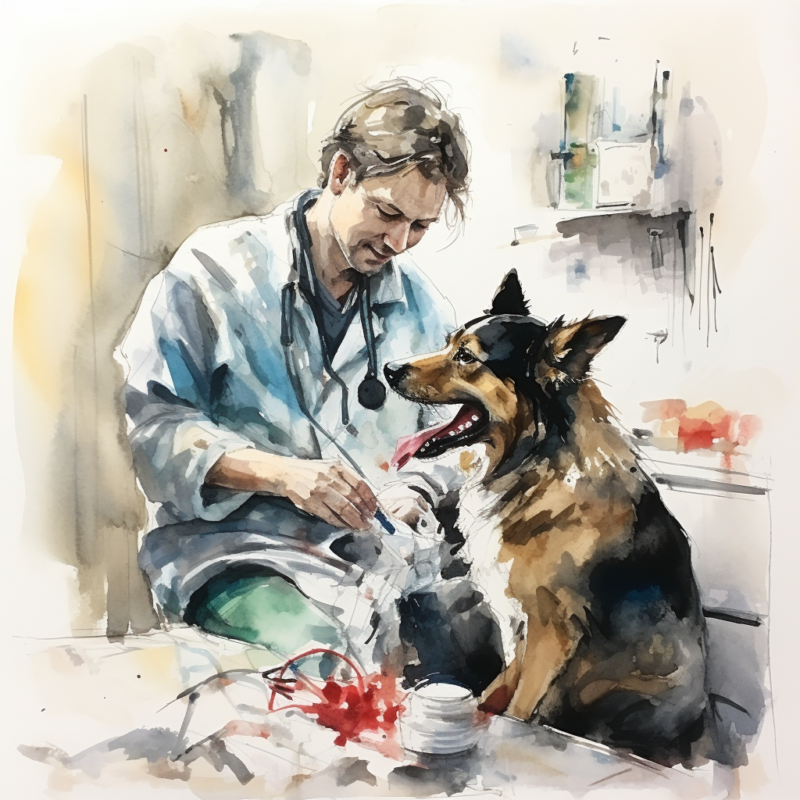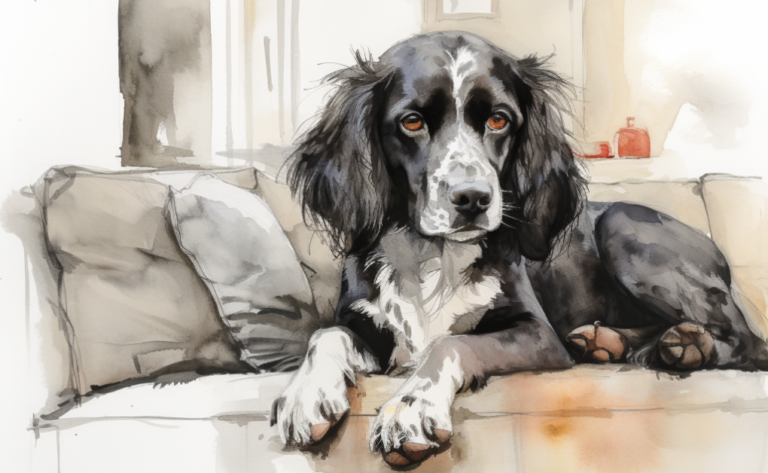What is Dilated Cardiomyopathy in Dogs?
What is it?
How is it Treated?
Breed Predispositions
Doberman Pinscher, Great Dane, Boxer, Bull Mastiff, Newfoundland, Irish Wolfhound, Miniature Schnauzer, Yorkshire Terrier, Poodle, Maltese and Chihuahua.
Introduction
For years, Jenna and her energetic Doberman, Rocky, had been inseparable, spending countless hours exploring the great outdoors together. Recently, however, Jenna noticed that Rocky was becoming increasingly lethargic and short of breath after even short walks. Concerned about her beloved companion’s well-being, Jenna took Rocky to the veterinarian for a comprehensive examination. The vet diagnosed Rocky with dilated cardiomyopathy, a serious heart condition that can affect dogs.
Dilated Cardiomyopathy in dogs (DCM) represents a significant heart condition. During this disease, the dog’s heart muscle weakens and expands, impeding its ability to pump blood effectively. As per the Veterinary Medical Database (Sisson et al., 2000), from 1986 to 1991, DCM was diagnosed in 0.5% of the dogs evaluated at U.S. referral hospitals. Over time, this condition can evolve, causing a deterioration in the dog’s general health and may ultimately threaten its life.
Certain breed dogs, giant breed dogs, exhibit a high prevalence of DCM, indicating a genetic predisposition to DCM. In addition, multiple DCM cases have been reported to the FDA, further underscoring the prevalence of this condition. The condition also takes various forms of DCM, often leading to heart rhythm problems.
Types of Cardiomyopathy in Dogs
Cardiomyopathy is a term used to describe heart muscle diseases in dogs. There are several types of cardiomyopathy in dogs, each with distinct characteristics and causes:
1. Dilated Cardiomyopathy (DCM)
This type is characterized by the enlargement of the heart chambers and weakening of the heart muscle, leading to reduced pumping efficiency. It is common in Doberman Pinschers, Great Danes, Boxers, and Irish Wolfhounds.
2. Hypertrophic Cardiomyopathy (HCM)
HCM is marked by the thickening of the heart muscle, particularly in the left ventricle, which reduces the heart’s ability to relax and fill with blood. This type of cardiomyopathy is more common in cats than dogs but can still affect some canine breeds.
3. Restrictive Cardiomyopathy (RCM)
RCM is the least common form of cardiomyopathy in dogs. It is characterized by the stiffening of the heart muscle, which prevents the heart chambers from expanding and filling with blood correctly. In addition, RCM can be caused by scar tissue, inflammation, or other factors that affect the heart’s flexibility.
4. Arrhythmogenic Right Ventricular Cardiomyopathy (ARVC)
This type of cardiomyopathy, also known as Boxer Cardiomyopathy, primarily affects Boxer dogs. ARVC is characterized by replacing the right ventricular heart muscle with fatty or fibrous tissue, leading to abnormal heart rhythms and potentially sudden death.
Each type of cardiomyopathy in dogs has specific causes, symptoms, and treatment options. Therefore, early diagnosis and appropriate management are crucial to improve the quality of life and extend the lifespan of a dog with cardiomyopathy.
What Causes Dilated Cardiomyopathy in Dogs?
Dilated Cardiomyopathy (DCM) in dogs, while its precise cause remains elusive, is believed to have several potential origins. It’s understood that genetics significantly contribute to the condition, resulting in cases of familial dilated cardiomyopathy. In addition, Doberman Pinschers have a reported incidence rate of 50% in males and 33% in females (Oyama, 2015), while Irish Wolfhounds have an overall breed incidence of 25%. Researchers have detected specific gene mutations in these breeds that augment the DCM risk.
Nutritional deficiencies represent another significant factor contributing to DCM, with taurine deficiency mainly linked to the condition. Certain breeds, like Golden Retrievers and American Cocker Spaniels, are more prone to taurine-responsive DCM, a variant of canine heart disease. In such instances, taurine supplementation could enhance heart function.

In some cases, infections triggered by bacteria, viruses, or parasites can incite DCM by causing inflammation or damage within the heart muscle. In addition, exposure to specific toxins, such as chemotherapy drugs like doxorubicin, can also damage the heart muscle, precipitating DCM.
Immune-mediated diseases, where the dog’s immune system attacks its heart muscle, can also lead to DCM. This immune response causes inflammation and damage within the heart chamber, potentially triggering ventricular tachycardia, a form of heart rhythm disorder.
Despite these known factors, many cases of DCM in dogs remain idiopathic or primary DCM, meaning the exact cause is unidentified. Hence, it is essential to regularly consult with a healthcare provider to monitor your pet’s heart health. In addition, recent research suggests a possible link between specific diets and the incidence of DCM, emphasizing the importance of proper nutrition in maintaining heart health.
Dilated Cardiomyopathy in Dogs May Cause Other Diseases
- Congestive heart failure (CHF): DCM reduces the heart’s ability to pump blood effectively, which can lead to fluid buildup in the lungs (pulmonary edema) or abdomen (ascites), causing congestive heart failure.
- Arrhythmias: DCM can cause irregular heartbeats, also known as arrhythmias, which can further compromise the heart’s ability to pump blood and may even be life-threatening.
- Thromboembolism: The pooling of blood in the dilated heart chambers can lead to the formation of blood clots. These clots can dislodge and travel to other body parts, blocking blood flow and causing thromboembolism. The most common site for thromboembolism in dogs is the lungs (pulmonary thromboembolism).
- Fainting or syncope: Reduced blood flow to the brain due to DCM may cause fainting or syncope in dogs.
- Kidney dysfunction: Decreased blood flow to the kidneys due to DCM can impair their function, potentially leading to kidney disease or even kidney failure.
- Liver dysfunction: Similarly, impaired blood flow to the liver due to DCM can lead to liver dysfunction or failure.
- Sudden cardiac death: In severe cases, DCM can lead to sudden cardiac death, often caused by severe arrhythmias or acute heart failure.
Symptoms of Dilated Cardiomyopathy in Dogs
Dilated Cardiomyopathy (DCM) in dogs can present a variety of symptoms, the manifestation of which can fluctuate based on the severity of the condition and the individual dog’s characteristics. The symptom profile can include the following:
- A marked decrease in activity or noticeable lethargy, symptomatic of their reduced energy levels.
- Weakness or intolerance to exercise, limiting their usual physical activities.
- Respiratory problems such as rapid or difficult breathing, clinically known as dyspnea. Coughing, which may become more frequent or severe.
- Fainting or sudden collapse, known as syncope.
- A distended abdomen resulting from fluid accumulation, a condition termed ascites.
- Weight loss or poor appetite, affecting their overall health.
- Irregular or rapid heart rhythms, indicating arrhythmias.
- Cold extremities, suggesting poor circulation.
- Pale or bluish mucous membranes, like gums or lips, signaling poor oxygenation.
- In the most severe cases, sudden cardiac death may occur.
It’s crucial to monitor these symptoms and consult a healthcare provider if any are observed, as early detection can lead to better disease management. In addition, other conditions, such as thyroid disease, can mimic or exacerbate some clinical signs of DCM, making veterinary consultation crucial for accurate diagnosis and treatment.
Diagnosing Dilated Cardiomyopathy in Dogs
Diagnosing Dilated Cardiomyopathy (DCM) in dogs is a thorough, multi-faceted process incorporating numerous diagnostic procedures. Each test offers vital insights into the dog’s cardiovascular health, enabling the veterinarian to ascertain the existence of DCM and assess its intensity.
Detailed Medical History
The diagnostic journey for DCM initiates with a comprehensive pet history. The owner might be queried about the dog’s nutrition, exercise regimen, and any noted alterations in behavior or physical condition. Data on the onset, duration, and evolution of symptoms can offer essential clues regarding the potential presence of DCM. This can also help the vet understand any potential connection between specific diets and cases of canine DCM.
Physical Examination
During a physical evaluation, the vet will use a stethoscope to listen to the dog’s heart and lungs. This can disclose abnormal heart rhythms or murmurs and changes in lung sounds, which might signify fluid buildup due to heart failure. The vet will also inspect for other indications of heart disease, such as pale gums, a weak pulse, or a swollen abdomen.
Radiographs (X-rays)
Radiographs can illustrate the heart’s shape and size. In dogs with DCM, the heart, particularly the left ventricle and atrium, may appear notably enlarged. Radiographs can also reveal signs of fluid accumulation in the lungs or chest cavity, a complication of advanced DCM.
Electrocardiogram (ECG or EKG)
An ECG monitors the heart’s electrical activity and can help identify abnormal heart rhythms (arrhythmias), common in dogs with DCM. For instance, some dogs with DCM may have a normal heart rhythm at rest but develop arrhythmias during exercise or stress.
Holter Monitor
A Holter monitor is a portable device that records the heart’s electrical activity continuously over 24 to 48 hours. It assists in capturing intermittent or exercise-induced arrhythmias that might not be detected during a short-term ECG. A Holter monitor can help confirm the DCM diagnosis and guide decisions about medication for controlling arrhythmias by providing an extensive record of the dog’s heart rhythm over a prolonged period.
Echocardiogram
An echocardiogram, or cardiac ultrasound, is the most conclusive test for diagnosing DCM. This non-invasive test employs sound waves to produce real-time images of the heart’s chambers and valves. It can disclose the characteristic dilation of the heart chambers and reduced contraction of the heart muscle seen in DCM.
Blood Tests
Blood tests, including a complete blood count, biochemistry profile, and cardiac biomarkers, can furnish supplementary information about the dog’s overall health and the impact of DCM on other body systems. They can also assist in ruling out other potential causes of the dog’s symptoms, including the risk of a blood clot.
All these tests contribute to a comprehensive understanding of the dog’s cardiovascular health, enabling the veterinarian to diagnose DCM and devise an appropriate treatment plan. Such a diagnosis, in turn, could contribute to a broader clinical trial or investigation into potential familial DCM cases and the history of DCM within specific breeds.
Treatment for Dogs with Dilated Cardiomyopathy
If your dog has been diagnosed with Dilated Cardiomyopathy (DCM), he may require treatment. The treatment plan can encompass medications, dietary changes, and in some instances, surgical interventions. In addition, the longevity of dogs with this condition can vary widely, so it’s crucial to monitor your pet closely and reach out to your vet if his health deteriorates.
Medications
Medications are often the first-line approach for managing Dilated Cardiomyopathy (DCM) in dogs. The goal is to enhance heart function, alleviate symptoms, and slow disease progression. Typically, a blend of drugs is used to tackle different facets of the condition. Here are some commonly prescribed medications for dogs diagnosed with DCM:

- ACE inhibitors such as enalapril or benazepril work by relaxing blood vessels, reducing high blood pressure, and lessening the heart’s workload. They also aid in decreasing fluid buildup in the lungs, alleviating symptoms of heart failure.
- Diuretics like furosemide: Also known as “water pills,” diuretics help to expel excess fluid from the body by promoting urine production, which assists in reducing congestion and swelling associated with heart failure.
- Beta-blockers, for example, carvedilol: These medications aid in controlling heart rate and enhancing heart function by mitigating the effects of stress hormones on the heart. They can also help to prevent arrhythmias in some instances.
- Positive inotropes like pimobendan: These drugs enhance the heart’s contraction strength, augmenting pumping efficiency. Pimobendan has been proven to improve survival times and quality of life in dogs with DCM.
- Antiarrhythmic medications such as sotalol or amiodarone: If a dog with DCM experiences significant arrhythmias or irregular heartbeats, these medications may help maintain a regular heart rhythm.
- Taurine and L-carnitine supplements: Primarily, when DCM is related to a taurine deficiency, supplementing with taurine and/or L-carnitine may boost heart function.
Dietary Modifications
Dietary adjustments are critical in supporting the overall health of dogs, addressing specific nutritional requirements, and managing health conditions. Some important aspects of dietary modifications in dogs include:
- Life stage: Different life stages, like puppies, adults, and seniors, have unique nutritional requirements. Puppies need diets rich in protein, fat, and calories for growth, whereas seniors may require lower-calorie diets to maintain a healthy weight and prevent obesity-related issues.
- Activity level: Active dogs require more calories and nutrients than sedentary dogs to support their energy needs. Caloric intake adjustments based on the dog’s activity level aid in maintaining optimal weight and overall health.
- Health conditions: Dogs with particular health conditions, such as kidney disease, diabetes, or allergies, often require custom diets to manage their condition.
- Weight management: Overweight dogs require a diet with fewer calories, less fat, and more fiber, while underweight dogs may need a diet with more calories and higher fat content to safely gain weight.
- Allergies and sensitivities: Some dogs may develop allergies or sensitivities to specific ingredients in their food, requiring a hypoallergenic or limited-ingredient diet.
- Breed-specific needs: Certain breeds may have specific dietary requirements due to genetic predispositions. For example, Dalmatians require a diet low in purines to prevent urinary stones.
Surgical Procedures
While not standard, there are a few surgical procedures that might be considered in some instances:
- Pacemaker implantation: If a dog with DCM develops severe arrhythmias that do not respond to medications, a pacemaker may be surgically implanted to regulate the heart rate and rhythm.
- Left ventricular assist device (LVAD) implantation: In very severe cases of DCM, a dog may be a candidate for the implantation of an LVAD to support the heart in pumping blood more effectively.
- Pericardiectomy: In rare instances, dogs with DCM may develop constriction of the pericardium. Surgically removing part of the pericardium can relieve this constriction.
In extreme cases, a heart transplant might be considered, though this procedure is very complex and uncommon in veterinary medicine. An implantable cardioverter defibrillator could also be an option to maintain normal heart rhythms in dogs with recurrent severe arrhythmias.
DCM often necessitates a comprehensive diagnostic and treatment approach to ensure affected dogs’ health and quality of life. By understanding the various treatment options, pet owners can contribute to the well-being of their furry friends, whether they are healthy dogs or those afflicted with conditions like DCM.
How Do I Prevent Dilated Cardiomyopathy in My Dog?
Preventing Dilated Cardiomyopathy (DCM) in dogs can be a complex task, given the incomplete understanding of the precise origins of the condition. However, specific strategies can be employed to mitigate the risk of your dog potentially succumbing to DCM:
- Routine veterinary examinations: Regular check-ups with your vet can aid in the early detection of potential health complications, including DCM. An early diagnosis often leads to more successful treatment and control of the condition.
- Nutritious diet: Supplying your dog with a nutritionally balanced diet suitable for their age is vital. Some instances of DCM have been associated with taurine deficiencies; hence, ensuring your dog’s diet, including dry dog food, is complete and balanced is essential. Consult with your vet about possible supplementation if necessary.
- Breed predisposition vigilance: If your dog belongs to a breed with a higher risk of DCM, such as Doberman Pinschers or Great Danes, it’s crucial to be extra cautious about their heart health. Discuss potential screening tests or preventive measures with your veterinarian.
- Weight management: Obesity can impose additional strain on your dog’s heart, so it’s crucial to maintain a healthy weight in your dog through balanced nutrition and regular physical activity.
- Frequent exercise: Promote regular, age-appropriate exercise for your dog to help maintain their holistic health and cardiovascular fitness.
- Toxin protection: Safeguard your dog from toxins or chemicals that could inflict heart damage or other health complications.
It’s noteworthy that DCM in dogs is usually a progressive condition. Dogs diagnosed with DCM may experience heart failure caused by dilated cardiomyopathy, and there has been an increase in cases of DCM in recent years. The Food and Drug Administration (FDA) has been investigating a potential link between specific diets and DCM in dogs, emphasizing the importance of a balanced diet for healthy dogs. Therefore, establishing a personalized health plan for your dog in close collaboration with your vet, monitoring their overall health, and addressing potential health issues promptly is of utmost importance.
Frequently Asked Questions
Disclaimer: The information provided on this veterinary website is intended for general educational purposes only and should not be considered as a substitute for professional veterinary advice, diagnosis, or treatment. Always consult a licensed veterinarian for any concerns or questions regarding the health and well-being of your pet. This website does not claim to cover every possible situation or provide exhaustive knowledge on the subjects presented. The owners and contributors of this website are not responsible for any harm or loss that may result from the use or misuse of the information provided herein.







